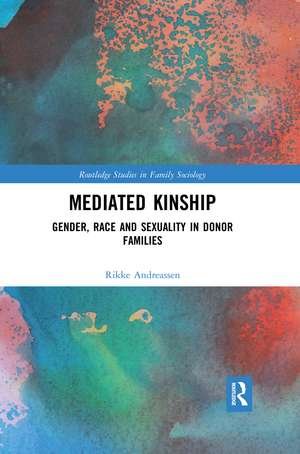Mediated Kinship: Gender, Race and Sexuality in Donor Families: Routledge Studies in Family Sociology
Autor Rikke Andreassenen Limba Engleză Paperback – 14 ian 2020
| Toate formatele și edițiile | Preț | Express |
|---|---|---|
| Paperback (1) | 389.38 lei 6-8 săpt. | |
| Taylor & Francis – 14 ian 2020 | 389.38 lei 6-8 săpt. | |
| Hardback (1) | 1000.27 lei 6-8 săpt. | |
| Taylor & Francis – 20 aug 2018 | 1000.27 lei 6-8 săpt. |
Din seria Routledge Studies in Family Sociology
-
 Preț: 309.23 lei
Preț: 309.23 lei - 18%
 Preț: 1005.73 lei
Preț: 1005.73 lei -
 Preț: 379.68 lei
Preț: 379.68 lei -
 Preț: 383.71 lei
Preț: 383.71 lei -
 Preț: 389.66 lei
Preț: 389.66 lei -
 Preț: 311.41 lei
Preț: 311.41 lei
Preț: 389.38 lei
Nou
Puncte Express: 584
Preț estimativ în valută:
74.51€ • 79.67$ • 62.12£
74.51€ • 79.67$ • 62.12£
Carte tipărită la comandă
Livrare economică 18 aprilie-02 mai
Preluare comenzi: 021 569.72.76
Specificații
ISBN-13: 9780367478896
ISBN-10: 0367478897
Pagini: 198
Ilustrații: 2
Dimensiuni: 156 x 234 x 11 mm
Greutate: 0.45 kg
Ediția:1
Editura: Taylor & Francis
Colecția Routledge
Seria Routledge Studies in Family Sociology
Locul publicării:Oxford, United Kingdom
ISBN-10: 0367478897
Pagini: 198
Ilustrații: 2
Dimensiuni: 156 x 234 x 11 mm
Greutate: 0.45 kg
Ediția:1
Editura: Taylor & Francis
Colecția Routledge
Seria Routledge Studies in Family Sociology
Locul publicării:Oxford, United Kingdom
Public țintă
Postgraduate and UndergraduateCuprins
Acknowledgements
1. Introduction: motherhood and the Web 2.0
2. Creating family
3. The missing father
4. Race and reproduction
5. Community and new scripts of family
6. Conclusion: expansion within limits
References
Index
1. Introduction: motherhood and the Web 2.0
2. Creating family
3. The missing father
4. Race and reproduction
5. Community and new scripts of family
6. Conclusion: expansion within limits
References
Index
Notă biografică
Rikke Andreassen is Professor (MSO) of Communication in the Department of Communication and Arts at Roskilde University, Denmark. She is the author of Human Exhibitions: Race, Gender and Sexuality in Ethnic Displays and the co-editor of Affectivity and Race: Studies from Nordic Contexts and Mediated Intimacies: Connectivities, Relationalities and Proximities.
Recenzii
"This is a groundbreaking book and must read for all interested in critical queer and feminist kinship studies. Methodologically innovative and theoretically rigorous, it raises new questions about what counts as kinship and community as affective attachments to "biology" become increasingly mediated, animated and challenged through a range of technologies."
Ulrika Dahl, Uppsala University, Sweden.
"Mediated Kinship is a ground-breaking, richly researched, and sophisticatedly theorized book on queer motherhood, kinship and racialization, based on empirical research on the recent queer baby boom in Scandinavia and the role of social media in queer reproduction and family building. Rikke Andreassen cuts elegantly through the biology versus social proximity debates regarding priorities in queer family building, looking instead at the fascinating messiness of queer mothers’ online practices."
Nina Lykke, Linköping Unversity, Sweden.
"Mediated Kinship is a ground-breaking, richly researched, and sophisticatedly theorized book on queer motherhood, kinship and racialization, based on empirical research on the recent queer baby boom in Scandinavia and the role of social media in queer reproduction and family building. Rikke Andreassen cuts elegantly through the biology versus social proximity debates regarding priorities in queer family building, looking instead at the fascinating messiness of queer mothers’ online practices."
Nina Lykke, Linköping Unversity, Sweden.
Descriere
Illustrating the fascinating intersections of social media and new kinship, this book presents a study of the increasing numbers of families using the world’s largest sperm bank and the development of new extended families involving large numbers of donor siblings.
